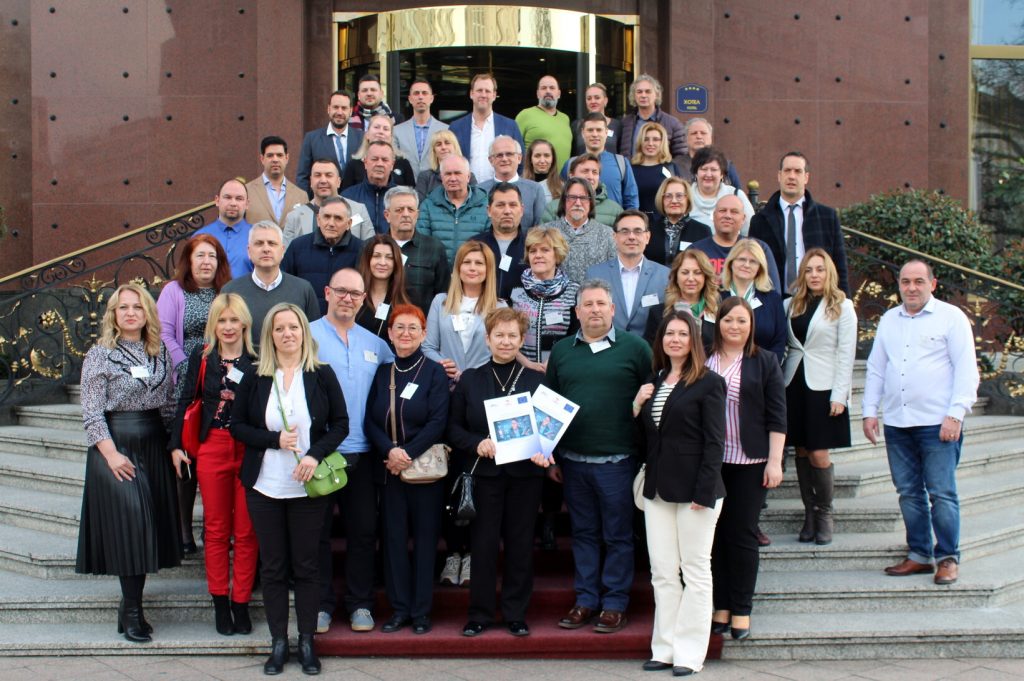The impact of digitization on gender equality is tremendous. Opportunities are not always equal nor is the remuneration. The Republican Trade Union of Employees in Banks, Insurance Companies and Other Financial Organizations of Serbia RS BOFOS in cooperation with European Centre for Workers’ Questions (EZA) and with the support of the European Commission organized a seminar with the theme: “Equal opportunities on the labour market Gender Equality and the Fourth Industrial Revolution”. The seminar was held, in Belgrade, Serbia from 02-05 March 2022.
Ms. Mara Erdelj, President of RS BOFOS opened the seminar. It was the first time that RS BOFOS was able to organize its own seminar after becoming a full member of EZA last October. The following speaker, Ms. Sigrid Schraml, Secretary General of the European Centre for Workers’ Questions – EZA (online), stressed that there are still many challenges when it comes to the position of women. Certainly when looking at things such as the pay-gap. Mr. Bjørn van Heusden, Executive Secretary of the World Organization of Workers – WOW, confirmed this and took the opportunity to congratulate RS BOFOS on its full EZA membership. Human Resources Director at Erste Bank a.d. Novi Sad Ms. Hana Škero Kosi? talked about why it is important for companies to deal with this topic, from the employer’s point of view, while Milana Rikanovic, Head of UN Women Serbia had an introductory speech from the perspective of this important institution that participants visited the next day.
Ms. Anda Petrovic, Expert Associate of the Coordination Body for Gender Equality of the Government of the Republic of Serbia started by introducing the Gender Equality Index. This is a unique measuring instrument that synthesizes the complexity of gender equality as a multidimensional problem into data that is easy to use and easy to interpret the Index consists of 6 key domains: labour, money, knowledge, time, power and health. ‘Serbian women workers on platform are more educated than men, but earn 9.1% less than men, said Ms. Petrovic.
One of the main problems faced by women on the labour market is that there are still more economically inactive women than men, that women are more represented in sectors with relatively low wages, and that the difference in wages in the private sector is greater than in the public sector, Ms. Irina Semjonova Expert of the Project “Practical Implementation and Improving Supervision of Labour Protection Regulations” of the Free Trade Union Confederation of Latvia (LBAS), stated.
‘When we look at the current situation we see that the gender gap increased under the influence of the pandemic’, said Ms. Veselina Starcheva, Trade Union expert from Confederation of Labour PODKREPA (Bulgaria). In “Going Digital: The Future of Work for Women“ she stated that according to the World Economic Forum’s 2021 Global Gender Gap Report the gender gap will not disappear until 2288. As for the representation of women in politics, the gender gap has worsened with the pandemic. When it comes to the future of work for women, the opportunities for new technologies and digitalisation for women can be positive: women can acquire new skills; they can also generate new sources of income combined with flexibility; they can easily connect, work from home.
Ms. Vesna Mamic, President of the Croatian Telecommunications Trade Union talked about confirmed that there are indeed chances, but also said ‘While some believe that digitalization will empower women for entrepreneurship, others fear that the digitalization and relocation of jobs from the predominantly female sectors will further deepen the employment gap between men and women’. She further emphasized that the STEM sector (science, technology, engineering and mathematics) is dominated by men. For every 6 new jobs in the STEM sector, women get one job, while men get 5 jobs.
Ms. Biljana Simic Director in the Consulting Department, Deloitte Advisory d.o.o. Belgrade emphasized that large IT companies are working slowly but continuously to increase the number of employed women. The share of women in IT has actually increased from 30.8% in 2019 to 32.90% now.
Currently more women than men enrol and graduate from colleges and universities, Ms. Marija Parun Kolin, Senior Social Researcher & Consultant, Center for Sociological Research at the Institute of Social Sciences pointed out. Recent data point to the growing digital literacy of women as it equates with men. Women, however, still earn less (11% less) than men even though they have better qualifications, said Marija Parun Kolin.
On Friday, March 4, the participants visited the UN Women Office in Serbia, United Nations Agency for Gender Equality and Women’s Empowerment. At the UN Women Office in Serbia, participants were welcomed by the UN Serbia Resident Coordinator François Jacob, Technical Project Analyst Natalija Ostojic, Gender Responsive Budgeting Programme Coordinator UN Women Olja Jankovic Lekovic, and Project Officer UN Women, Nevena Marceta.
So although many steps in the right direction are taken there is still much room for improvement when it comes to the position of women. Trade union should try to do their utmost to improve the equality. A larger part of the workforce consists of women so there is much to do. And of course in the end this may also benefit the unions through membership. And it will be clear that the union doing this best will most probably benefit most. So a win-win situation.
for pictures click here





